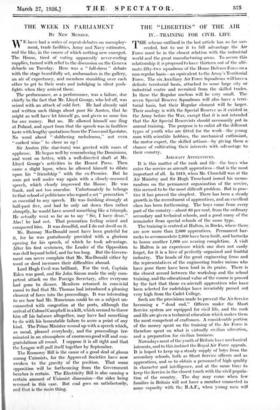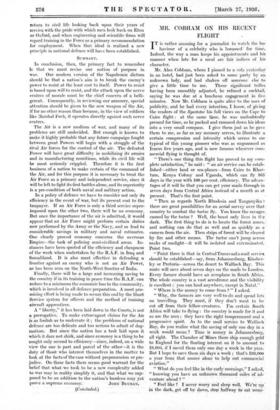THE - "LIBERTIES" OF THE AIR ' IV.—TRAINING FOR CIVIL LIFE
THE scheme outlined in the last article has so' far sue- • ceeded, but to- use it to -full advantage the Air Force must be in the closest relation with the-industrial world and the great manufacturing areas. To secure this 'relationship it is proposed to have thirteen out of the ulti- mate. fifty-two squadrons of the Home Defence Force on a .
• non-regular basis—an equivalent to the Army's Territorial Force. The six Auxiliary Air Force Squadrons will have a definite territorial basis, attached to sonic large city or industrial centre and recruited from the skilled trades. In these the Regular nucleus will be very small. The seven Special Reserve Squadrons will also have a terri- torial basis, but their Regular element will be larger. Their analogy is with the Special Reserve as it existed in the Army before the War, except that it is not intended that the Air Special Reservists should necessarily put in annual training. The purpose is to enlist all the different types of youth who are fitted for the work—the young man with scientific hobbies, the mechanical enthusiast, the motor expert, the skilled artisan—by giving them a chance of cultivating their interests with advantage to .
their country. _
. AIRCRAFT APPRENTICES.
It is this matter of -the rank and file—the boys who enter the service as aircraft apprentices—that is the most important of all. -In 1919, when Mr. Churchill was at the Air Ministry and Sir Hugh Trenchard issued his memo- randum on- the permanent organization of the service,- this seemed to be the most difficult problem. But in prac- tice it has proved the simplest. There has been a steady growth in the recruitment of apprentices, and an excellent class has been forthcoming. The boys come from every part of the country—about 80 per cent. from the ordinary secondary and technical schools, and a good many of the remainder from special schools of the same type.
The training is centred at Halton, in Bucks, where there.: are now more than 2,000 apprentices. Permanent bar- racks to accommodate 2,000 have been built, and barracks to house another 1,000 are nearing completion. A visit to Halton is an experience which one does not easily forget, for it is a hive of perfectly organized and fruitful industry. The heads of the great engineering firms and the representatives of the engineering trades unions who have gone there have been loud in its praise. There is the closest accord between the workshop and the school training, and the educational value of the course is proved by the fact that those ex-aircraft apprentices who have been selected for cadetships have invariably passed out very high from the Cadet College.
Such are the provisions made to prevent the Air Service becoming a " dead end." Officers under the Short Service system are equipped for civil life, and the rank and file are given a technical education which makes them the most competent of craftsmen. A considerable portion of the money spent on the training of the Air Force is therefore spent on what is virtually civilian education, and a preparation for civilian business. Nowadays most of the youth of Britain have mechanical interests, and to this instinct the Royal Air Force appeals. It is hoped to keep up a steady supply of boys from the secondary schools, both as Short Service officers and as apprentices, and so to obtain a personnel of high quality in character and intelligence, and at the same time to keep the Service in the closest touch with the civil popula- tion of the country. The day may come when few families in Britain will not have a member connected in some capacity with th:! when young men will return to civil life looking back upon their years of service with the pride with which men look back on Eton or Oxford, and when engineering and scientific firms will regard training in the Force as a primary recommendation for employment. When that ideal is realized a new principle in national defence will have been established.
SUMMARY.
In conclusion, then, the primary fact to remember is that we must revise our notion of purpose in war. Our modern version of the Napoleonic dictum should be that a nation's aim is to break the enemy's power to resist at the least cost to itself. Power to resist is based upon will to resist, and the attack upon the nerve centres of morale must be the chief concern of a belli- gerent. Consequently, in reviewing our armoury, special attention should be given to the new weapon of the Air, if for no other reason than because, in the view of soldiers like Marshal Foch, it operates directly against such nerve centres.
The Air is a new medium of war, and many of its problems are still undecided. But enough is known to make it highly probable that any future campaign fought between great Powers will begin with a struggle of the rival Air forces for the control of the air. The defeated Power will have great difficulty in mobilizing its armies and in manufacturing munitions, while its civil life will be most seriously crippled. Therefore it is the first business of a nation to make certain of the command of the Air; and for this purpose it is necessary to treat the Air Force as a primary and independent service, since it will be left to fight its first battles alone, and its superiority is a pre-condition of both naval and military action.
In a policy of defence we have to consider not only its efficiency in the event of war, but its present cost to the taxpayer. If an Air Force is only a third service super- imposed upon the other two, there will be no economy. But once the importance of the air is admitted, it would appear that art Air Force might perform certain duties now performed by the Army or the Navy, and so lead to considerable savings in military and naval estimates. One clearly proved economy concerns the overseas Empire—the task of policing semi-civilized areas. In- stances have been quoted of the efficiency and cheapness of the work when undertaken by the R.A.F. in Iraq and Somaliland. It is also most effective in defending a frontier against an enemy who is not an Air Power, as has been seen on the North-West frontier of India.
Finally, there will be a large and increasing saving to the country if in its training in peace time the R.A.F. can reduce to a minimum the economic loss to the community, which is involved in all defence preparation. A most pro- mising effort is being made to secure this end by the Short Service system for officers and the method of training aircraft apprentices.
A " liberty," it has been laid down in the Courts, is not a prerogative. To make extravagant claims for the Air is as foolish as to underrate it ; the problems of national defence are too delicate and too serious to admit of dog- matism. But since the nation has a task laid upon it which it dare not shirk, and since economy is a thing to be sought only- second to efficiency—since, indeed, on a wide view the one is part and parcel of the other—it is the duty of those who interest themselves in the matter to look at the facts'of the base without prepossession or pre- judice. On these facts there seems good warrant for the belief that what we took to be a new complexity added to war may in reality simplify it, and that what we sup- posed to be an addition to the nation's burdens may yet (Coitcludee.)























































 Previous page
Previous page